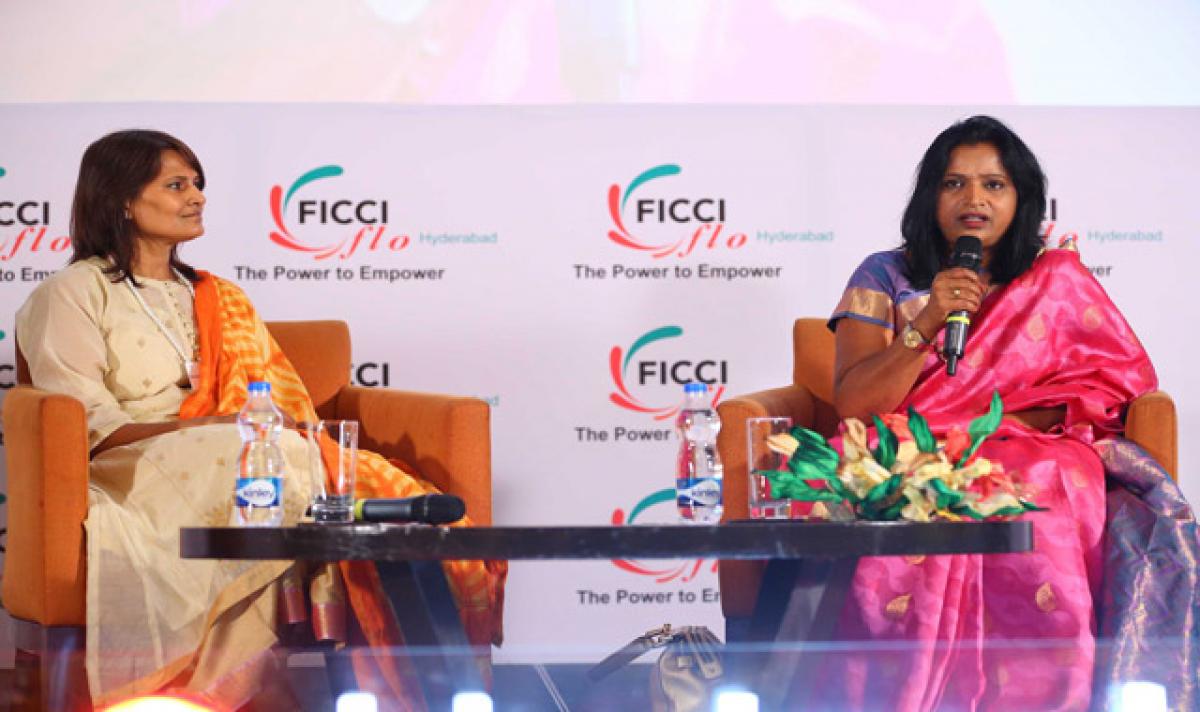Live
- First Impressions and Unboxing of the MacBook Pro M4: A Powerhouse for Professionals and Creators
- China Gears Up for Potential Trade War Amid Trump’s Tariff Threats
- Small Farmers Gain Less by Selling to Supermarkets: Study Reveals
- Why Despite the Controversy, America Is Anticipating the Mike Tyson vs. Jake Paul Fight
- Sanju Samson and Tilak Varma Shine: Record-Breaking Feats in 4th T20I Against South Africa
- India Urges $1.3 Trillion Annual Climate Support for Developing Nations
- Bad air: 106 shuttle buses, 60 extra Metro trips planned to make Delhiites give up cars
- WHO reports declining monkeypox cases in Congo
- CM Attends Kotideepotsavam on Kartika Purnima
- PKL Season 11: Raiding trio of Devank, Ayan, Sandeep help Patna Pirates rout Bengal Warriorz
Just In
Jyothi Reddy’s rags to riches story inspires FICCI’s Ladies Organisation


FICCI’s Ladies Organisation FLO, organised an interactive session with ‘The Game Changer’ Anil Jyoti Reddy, along with the newly assumed chairperson of FLO, Kamini Saraf, who also announced her theme ‘We Power’ for the year 2017 - 2018 on Friday at The Park Hyatt.
FICCI’s Ladies Organisation FLO, organised an interactive session with ‘The Game Changer’ Anil Jyoti Reddy, along with the newly assumed chairperson of FLO, Kamini Saraf, who also announced her theme ‘We Power’ for the year 2017 - 2018 on Friday at The Park Hyatt.
Speaking on the occasion Kamini Saraf said, “This year the national theme is ‘We Power’. So, we are working on different levels to empower women. This year we already have created 62 employments for women. We are also trying to employ women from the villages so that they need not depend on anybody.”
Anil Jyothi Reddy shared her arduous journey from an orphanage to being a successful entrepreneur during the interaction with the members. The story of Jyoti Reddy, about her extraordinary journey from a poverty ridden life to that of utmost luxury and success, served as a true inspiration to the members of the FLO.
She shared three things which define her experience, “First is ‘No compromise’ - women should not compromise; second thing is ‘no condition is permanent’- It just needs dedication to change our condition. I feel it is not just me, even APJ Abdul Kalam, worked very hard to change things. He is my mentor. And the third is ‘nothing is impossible’- If you work hard and really want to change, it will be possible because opportunity is everywhere - only you need to try for it.”
In her childhood, crushed by poverty after her father lost his job as a teacher, her parents decided to keep their son at home and leave their two daughters in an orphanage. Jyoti’s sister ran back to her parents. But young Jyoti- then barely nine lived in orphanage for five years.
“When I lived with orphans I knew the pain in life,” Jyothi says. She was married at the age of 16 “At 18, I was a mother of two girls. There was no money for either medicine or to buy them toys. When I thought of joining them in school, I selected Telugu medium because the fees was Rs 25 a month, while for an English medium school it was Rs 50 per month. I could educate both my girls at Rs 50.”
“I would dream of having more than enough food to feed my children. I did not want to give them the life I was leading,” she related. Jyothi got an opportunity to work in Government school, “I would inspire the kids to learn the basics.
Soon, I got a promotion, and visited many villages in Warangal to train women and youth to learn to stitch clothes.” She was now earning Rs 120 a month. “It was like as if I got one lakh rupees. I could spend on my children’s medicine. It was a lot of money for me.”
Inspired from her NRI cousin who lives in US, she determined to go US to meet her sister. Then with the help of relatives and friends she applied for a US visa. The American dream is not an easy one for her. “I did not know English properly, and it was a struggle every day.”
Finally when she did go to the US, she worked as a sales girl, then as a room service person in a motel in South Carolina, as a baby sitter in Phoenix, Arizona, as a gas station attendant, and software recruiter in Virginia. She took her daughters and husband with her to the US. Finally, she started her own business.
Today she is the proud CEO of Keys Software Solutions, a recruiting firm.
“When I had returned to my village after two years, I went to the village temple for Shiv puja and the priest told me, ‘You will not get a job in the US, but if you do business you will become a millionaire.’ At that time, I laughed at him because I knew how hard it was in America.”
Such has been her journey that Kakatiya University’s second degree English lesson has a chapter on her. “Believe me, once I had begged the same university to give me a job and they had refused. Today, a lot of village children read about me and want to know who this living person is.”

© 2024 Hyderabad Media House Limited/The Hans India. All rights reserved. Powered by hocalwire.com






